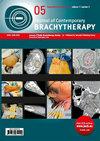采用体外放射治疗加高剂量率近距离放射治疗的再分层高危前列腺癌患者的不同治疗效果
IF 1.1
4区 医学
Q4 ONCOLOGY
引用次数: 0
摘要
目的:我们报告了高危前列腺癌(PCa)患者的治疗结果,这些患者最初是根据 NCCN 3 级分类系统接受体外放射治疗(EBRT)和高剂量率近距离放射治疗(HDR-BT)。材料与方法:纳入了1999年至2018年间接受EBRT、HDR-BT和雄激素剥夺疗法(ADT)治疗的471例高风险PCa患者。进行竞争风险生存分析,比较CAPRA评分< 6与≥6的个体的生化复发(BCR)和转移发生率。此外,还使用 Kaplan-Meier 分析法评估了两组患者的总生存期(OS)。结果:中位年龄为71岁,中位随访时间为72个月。整个组群的EQD2达到或超过74 Gy,中位EQD2为106.89 Gy。CAPRA评分≥6分和属于NCCN极高风险组均与BCR相关,亚分布危险比(sHR)分别为3.04(p = 0.015)和2.53(p = 0.013)。就转移发生率而言,CAPRA 组和 NCCN 组的 sHRs 相似,分别为 2.60(p = 0.094)和 2.71(p = 0.037)。结论:我们的研究表明,根据NCCN 3级系统分类的高危PCa患者可从CAPRA评分或NCCN 5级分层法的进一步分层中获益。CAPRA评分≥6分或被列为极高风险的患者发生BCR、转移和死亡的风险较高。根据正在进行的研究,这些患者可能会从进一步加强检查和治疗中获益。本文章由计算机程序翻译,如有差异,请以英文原文为准。
Differential outcomes of re-stratified high-risk prostate cancer patients treated with external beam radiation therapy plus high-dose-rate brachytherapy boost
Purpose:
We report outcomes of high-risk prostate cancer (PCa) patients, initially classified according to a 3-tier NCCN classification system, treated with external beam radiation therapy (EBRT) and high-dose-rate brachytherapy boost (HDR-BT). Patients were analyzed based on a re-stratification of their risk grouping using CAPRA score and a newer 5-tier NCCN classification.
Material and methods:
471 high-risk PCa patients treated with EBRT, HDR-BT, and androgen deprivation therapy (ADT) between 1999 and 2018 were included. Competing risk survival analyses to compare individuals with CAPRA scores < 6 vs. ≥ 6 for biochemical relapse (BCR) and metastasis incidence were conducted. Also, overall survival (OS) for both groups using Kaplan-Meier analysis was assessed. The same analyses were repeated using a 5-tier NCCN stratification comparing those classified as high-risk vs. very high-risk patients.
Results:
The median age was 71 years, and the median follow-up period was 72 months. The whole cohort received an EQD2 of 74 Gy or greater, with a median EQD2 of 106.89 Gy. Both a CAPRA score ≥ 6 and belonging to the NCCN very high-risk group were associated with BCR, with subdistribution hazard ratios (sHRs) of 3.04 (p = 0.015) and 2.53 (p = 0.013), respectively. For metastasis incidence, both the CAPRA and NCCN groups had similar sHRs of 2.60 (p = 0.094) and 2.71 (p = 0.037), respectively. For 10-year OS, patients with CAPRA score ≥ 6 and belonging to the NCCN very high-risk group presented similar HRs of 2.11 (p = 0.005) and 2.10 (p = 0.002).
Conclusions:
We showed that high-risk PCa patients classified according to the 3-tier NCCN system benefit from further stratification using the CAPRA score or the 5-tier NCCN stratification method. Patients with a CAPRA score ≥ 6 or classified as very high-risk demonstrate a higher hazard of BCR, metastasis, and death. These patients might benefit from further intensification of their investigations and treatment, based on ongoing research.
We report outcomes of high-risk prostate cancer (PCa) patients, initially classified according to a 3-tier NCCN classification system, treated with external beam radiation therapy (EBRT) and high-dose-rate brachytherapy boost (HDR-BT). Patients were analyzed based on a re-stratification of their risk grouping using CAPRA score and a newer 5-tier NCCN classification.
Material and methods:
471 high-risk PCa patients treated with EBRT, HDR-BT, and androgen deprivation therapy (ADT) between 1999 and 2018 were included. Competing risk survival analyses to compare individuals with CAPRA scores < 6 vs. ≥ 6 for biochemical relapse (BCR) and metastasis incidence were conducted. Also, overall survival (OS) for both groups using Kaplan-Meier analysis was assessed. The same analyses were repeated using a 5-tier NCCN stratification comparing those classified as high-risk vs. very high-risk patients.
Results:
The median age was 71 years, and the median follow-up period was 72 months. The whole cohort received an EQD2 of 74 Gy or greater, with a median EQD2 of 106.89 Gy. Both a CAPRA score ≥ 6 and belonging to the NCCN very high-risk group were associated with BCR, with subdistribution hazard ratios (sHRs) of 3.04 (p = 0.015) and 2.53 (p = 0.013), respectively. For metastasis incidence, both the CAPRA and NCCN groups had similar sHRs of 2.60 (p = 0.094) and 2.71 (p = 0.037), respectively. For 10-year OS, patients with CAPRA score ≥ 6 and belonging to the NCCN very high-risk group presented similar HRs of 2.11 (p = 0.005) and 2.10 (p = 0.002).
Conclusions:
We showed that high-risk PCa patients classified according to the 3-tier NCCN system benefit from further stratification using the CAPRA score or the 5-tier NCCN stratification method. Patients with a CAPRA score ≥ 6 or classified as very high-risk demonstrate a higher hazard of BCR, metastasis, and death. These patients might benefit from further intensification of their investigations and treatment, based on ongoing research.
求助全文
通过发布文献求助,成功后即可免费获取论文全文。
去求助
来源期刊

Journal of Contemporary Brachytherapy
ONCOLOGY-RADIOLOGY, NUCLEAR MEDICINE & MEDICAL IMAGING
CiteScore
2.40
自引率
14.30%
发文量
54
审稿时长
16 weeks
期刊介绍:
The “Journal of Contemporary Brachytherapy” is an international and multidisciplinary journal that will publish papers of original research as well as reviews of articles. Main subjects of the journal include: clinical brachytherapy, combined modality treatment, advances in radiobiology, hyperthermia and tumour biology, as well as physical aspects relevant to brachytherapy, particularly in the field of imaging, dosimetry and radiation therapy planning. Original contributions will include experimental studies of combined modality treatment, tumor sensitization and normal tissue protection, molecular radiation biology, and clinical investigations of cancer treatment in brachytherapy. Another field of interest will be the educational part of the journal.
 求助内容:
求助内容: 应助结果提醒方式:
应助结果提醒方式:


